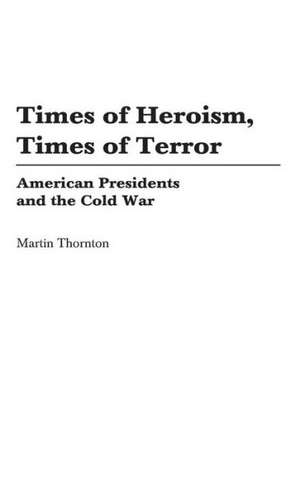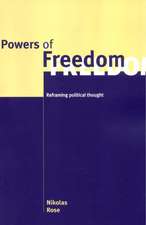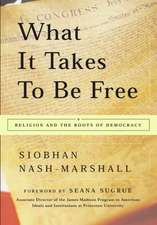Times of Heroism, Times of Terror: American Presidents and the Cold War
Autor Martin Thorntonen Limba Engleză Hardback – 29 mai 2005 – vârsta până la 17 ani
Preț: 346.34 lei
Preț vechi: 476.63 lei
-27% Nou
Puncte Express: 520
Preț estimativ în valută:
66.27€ • 72.21$ • 55.84£
66.27€ • 72.21$ • 55.84£
Carte tipărită la comandă
Livrare economică 23 aprilie-07 mai
Preluare comenzi: 021 569.72.76
Specificații
ISBN-13: 9780275980016
ISBN-10: 0275980014
Pagini: 190
Dimensiuni: 156 x 235 x 21 mm
Greutate: 0.48 kg
Editura: Bloomsbury Publishing
Colecția Praeger
Locul publicării:New York, United States
ISBN-10: 0275980014
Pagini: 190
Dimensiuni: 156 x 235 x 21 mm
Greutate: 0.48 kg
Editura: Bloomsbury Publishing
Colecția Praeger
Locul publicării:New York, United States
Notă biografică
Martin Thornton is a senior lecturer in the School of History at the University of Leeds, England. He has also been Director of the Centre for Canadian Studies at the University and a visiting professor at Vanderbilt University.
Cuprins
PrefaceAcknowledgmentsIntroductionTotal War and the Quest for Peace, 1945Harry S. Truman and Containment, 1946-1952Dwight D. Eisenhower and the Military Challenge, 1953-1960John F. Kennedy: The Problems of Foreign Policy Leadership, 1961-1963Lyndon B. Johnson at War: Home and Abroad, 1963-1968Richard M. Nixon, Henry Kissinger and the Search for Peace, 1969-1974Gerald R. Ford: An Interregnum, 1974-1976Jimmy Carter: Prisoner in the Rose Garden, 1977-1980Ronald Reagan, Star Wars and the Evil Empire, 1981-1988George H. W. Bush and the End the of Cold War, 1989-1991BibliographyIndex
Recenzii
Thornton has written a brief overview of the role of US presidents during the Cold War. He devotes one chapter to each leader from FDR to George H. W. Bush, briefly discussing their own military experiences (or lack thereof) and focusing on their decision-making styles. Although the presidents differed in the ways they made decisions, all from Truman forward operated under the broad Cold War consensus that posited a need to prevent the spread of communism. Especially interesting is the chapter on Gerald Ford, to whom Thornton gives high marks for not trying to reintervene in the Vietnam War and for establishing an aura of integrity and stability in the post-Watergate years..Recommended.
[S]omewhat unsettling but ringing with truth: university presidents' careers rise and fall in cycles, but those tough enough to take it seem to enjoy the ride.
[S]omewhat unsettling but ringing with truth: university presidents' careers rise and fall in cycles, but those tough enough to take it seem to enjoy the ride.










